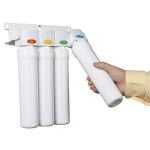We have received at least two dozen emails from people asking how they can remove mercury and other heavy metals from their drinking water — should their water tests come up positive.
First of all, mercury may appear as an inorganic compound or an organic compound. Each requires a different method of detection and also a different means of removal.
Most at-home test kits (such as Boris Mercury Check) test for something called free dissolved inorganic mercury. This means any mercury bound by organic compounds will not get detected.
To detect organically bound mercury as well as free dissolved mercury, also known as total mercury, scientists use more sophisticated methods of detection and that sort of testing most often must take place in a laboratory setting.
Removing Mercury From Drinking Water?
As stated earlier, a person will need different types of filters to remove the two different main types of mercury:
- Granulated Activated Carbon (GAC) filters remove organic mercury
- Reverse Osmosis (RO) filters remove inorganic mercury
So now the question becomes, “Which type of filtration system (Reverse Osmosis or Granulated Active Carbon) is right for YOU?” Answer: Both.
Don’t worry about having to choose two different systems and somehow get them to work with one another, though, because reputable companies manufacture easy-to-install RO/GAC Filtration Systems. See below for a few examples:






